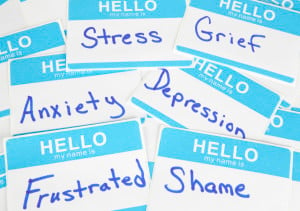How many times have you, or someone you know, claimed to be OCD because you can’t focus on anything unless the clothes in your closet are meticulously organized by colors?
Or called a crush bipolar for responding to your texts within either two minutes or two hours? Or felt “totally depressed” when Kourtney and Scott broke up on Keeping Up with the Kardashians?
Sounds familiar? Of course it does.
We all have an unfathomable capacity to deeply feel sadness, happiness, beauty, and every other gorgeously visceral emotion in varying degrees of magnitude – it is, after all, what makes us human.
But sometimes, we are not the best at describing our feelings.
Using mental illnesses as figures of speech has become so pervasive in our colloquialisms that many of us fail to even acknowledge its presence.
The National Alliance on Mental Illness reports 43.8 million American adults – approximately 19% of the population – experiences mental illness in a given year, including but not limited to depression, bipolar disorder, and OCD.
Which means the odds of you talking to your group of friends about “acting” depressed, ADD, or any other mental illness could actually be undermining one in five of your friends’ realities.
We’re all looking for ways to embellish our speech and make our listeners live vicariously through our words, but using psychiatric diagnoses to achieve this can be detrimental.
Depression is a reality for people that persists days beyond your favorite celebrity breakup.
Bipolar disorder consists of extreme mood swings pendulating between mania and depression, although many of us seem to connote it with rapidly fluctuating weather patterns.
And ADD negatively affects many students in ways that have nothing to do with your friend constantly checking her phone while you’re talking (although that is a terrible thing to do).
We’ve all been guilty of casually throwing in a mental illness into our sentences at the expense of someone else’s harrowing reality.
I myself have accused friends of “acting” depressed or schizophrenic or bipolar when I really should have just been perusing the thesaurus a bit better.
Once we are able to empathize with those amongst us who are living with mental illnesses and realize the effect of words, we can aim to stop using these diagnoses casually.
Here are a few reasons on why it’s harmful to use mental illnesses as figures of speech.
1. It Categorizes Very Real Illnesses into Acceptable and Unacceptable
Think of a friend who has an impeccably tidy room or takes thorough, outlined notes in class. There’s a good chance you or another of their friends have called them OCD.
Colloquially, OCD translates into neat, clean, and hardworking – and within this context, “being OCD” is a positive trait. However, the medical diagnosis of OCD translates to having repeated, persistent, and unwanted urges that cause severe distress or anxiety.
OCD patients can have horrific thoughts about harming themselves or partake in compulsive behaviors such as washing their hands till their skin is raw. If given the choice, I’m sure many OCD patients would not want their illness, but colloquially, it is something we strive for.
Similarly, if a friend is happy one day and upset the next, it might be tempting to call them bipolar (or schizophrenic, less endearingly). Both illnesses have harrowing consequences on the mind, but casual speech tells us those who are schizophrenic are “weird” or damaging to society.
There is no such a thing as a positive or negative mental illness.
A mental illness just means that the person who has one not always well. If an illness – whether it’s OCD or schizophrenia or bipolar disorder – is affecting a person’s ability to lead a happy and healthy life, it is not positive.
2. It Dilutes the Seriousness of Mental Illness
Web MD says a typical panic attack consists of shortness of breath, nausea, severe chills, or in extreme cases, fainting. Panic attacks are terrifying episodes in which the person who has it completely surrenders control to his or her mind.
So when someone claims to have a panic attack upon realizing they put their car keys in the wrong section of their backpack, it belittles a very distressing reality.
It’s easy not to take something seriously when you believe someone is just acting a certain way in given situations.
When mental illnesses are used as de facto adjectives for someone’s personality, it implies its receiver is only acting and not actually affected by the diagnoses.
For example, the severity of OCD is constantly pervasive in the lives of whom it affects, and doesn’t only rear its ugly head when you check the locks on your door five times before leaving for vacation.
Additionally, synonyms for words exist because there are varying magnitudes for words. The difference between feeling cold and freezing is quite tangibly different, just as laughter varies between a chuckle and roaring.
Mental illnesses, on the other hand, have blanket severity when they are used as adjectives. Someone could admit to feeling “depressed” about their favorite TV show ending just as likely as they would if they lost someone near to them.
But for people who have depression, it’s always a serious matter.
Physical illnesses carry virtually the same traits in everyone, which is why they are so much easier to validate. The severity and variations of mental illnesses are contingent to a person’s individual experiences; this makes it harder to understand what someone with a mental illness is going through because it is much harder to empathize.
Everyone has had the common cold at some point in their life and has been consumed by deep sniffles. On the other hand, everyone has felt sad but not everyone has had depression.
It’s often much harder to understand the gravity of someone else’s experiences. And by using diseases as personality traits, it goes to add to the misunderstanding.
It would be like telling someone they had pneumonia if they coughed.
3. It Further Contributes to Stigma
Mental illnesses, for the reasons listed above, are routinely categorized as much less important in comparison to physical illnesses.
Because it’s harder to grasp the harmful symptoms of someone else, many people are quick to attribute those with mental illnesses as just being spoiled. Therefore, a lot of sufferers are afraid to ask for help.
Every time these diseases are used as simple adjectives, it contributes to the stigma. It validates the claim that mental illnesses are just inside your head.
Insomnia is a disease where people can go days, even weeks, without sleep. Not being able to sleep for one night or choosing to stay up late to study for a test does not translate to insomnia, even though it’s colloquially deemed to be so.
For those of us who don’t have insomnia, pulling an all-nighter one night definitely ends in a nap or longer sleep the next day.
For those who do have insomnia, they have definitely heard someone who tells you to “just take a sleeping pill” or worse, “try counting sheep.” Hence, their illness is not recognized as valid or urgent.
Similarly, people who have anorexia suffer from a very real disease, but are living in a society where we idolize thinness. Just like OCD, anorexia can be seen as positive to many people.
I remember in middle school having a friend with particularly high metabolism and in turn, being extremely thin. Many girls would incorrectly “wish they were anorexic” like her and idolize her body.
But anorexia is not as simple as an unwillingness to eat or having very high metabolism – it’s a condition where one is so critical on themselves and their body that the act of eating is inconceivable.
But living in a world where we admire thin bodies, anorexia carries a stigma of being a plea for attention. “Wishing” to be anorexic further exacerbates that.
So don’t squash someone’s reality just because a few people are misusing the diagnosis. Insomnia, like every other mental illness, is extremely serious.
***
Perhaps the worst consequence of using mental illnesses as a stigma is how much it has the capacity to hurt those around you.
With one in five American adults experiencing some form of mental illness every year, it’s inevitable that someone in your office, class, or group setting will hear their mental conditions being described as temporary or casual.
If a lot of people are joking about someone being OCD, then it’s likely a person who really has OCD will not feel too good about themselves.
Those who are suffering and within earshot of your conversation might possibly feel ashamed of themselves. That, in turn, contributes to a culture of secrecy within the realm of mental illness and people will shy away from seeking help.
Casually misinterpreting mental illnesses further adds to its misunderstanding. And the more an illness is misunderstood, the more the sufferer will find it harder to open up about their experiences.
Words have a dreadful potential of hurting those around us, especially when those words are something they have lived.
In the interest of your friends or anyone around you, keep a close watch on what you say. You never know which doors you might be closing for someone who was willing to open up.
[do_widget id=’text-101′]
Nikita Redkar is a Contributing Writer for Everyday Feminism. She is a freelance writer in New York City who currently interns for Fusion Network where she writes about diversity in pop culture and how it’s shifting the current landscape of racial and gender politics. When she’s not writing, she is taking classes in sketch comedy and reading bizarre astronomy theories. She likes cute animal gifs and dislikes long walks on the beach, plagues, and other cliches.
Search our 3000+ articles!
Read our articles about:
Our online racial justice training
Used by hundreds of universities, non-profits, and businesses.
Click to learn more
Most Read Articles
- « Previous
- 1
- …
- 30
- 31
- 32




















